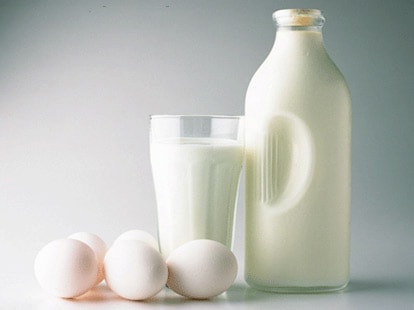Almost died from food allergy
Any food can cause allergies, of which cow's milk allergy is quite common.

Any food can cause allergies,
In which allergy to cow's milk is quite common (illustrative photo).
As soon as baby H showed signs of dizziness, nausea, and diarrhea, his family thought he had food poisoning, so they took him to Bac Ninh Provincial Hospital. Here, the child's condition gradually worsened, he became lethargic, had difficulty breathing, turned cyanotic, and had low blood pressure, so he was quickly given emergency care, intubated to support his breathing, and transferred to the hospital immediately.
The patient was transferred to the National Children's Hospital in critical condition, with respiratory failure, suspected to be due to anaphylactic shock to food. The patient was immediately given emergency treatment, vasopressors, anti-shock drugs, sedatives, and mechanical ventilation to ensure vital signs were maintained within normal limits.
After 4 days of intensive treatment, child H has escaped the critical condition, breathing on his own with oxygen support, and his pulse and blood pressure have returned to relatively normal levels. Currently, the patient is being treated at the clinical immunology and allergy department.
According to Dr. Do Thi Cam Thanh (National Children's Hospital), food allergies are not uncommon, and the incidence is increasing. According to a study in the US, 5.1% of children aged 0-17 had food allergies in the years 2009-2011, while the figure was only 3.4% in the years 1997-1999. Deaths due to anaphylaxis occur in about 500-1,000 cases each year in the US, and up to 30% of cases are anaphylaxis due to food.
According to a 2005 European study, there are many foods that can cause anaphylaxis, the most common being walnuts, peanuts and beans, accounting for more than 30% of cases. In addition, common causes of allergies in children are cow's milk, eggs, cereals, less common are seafood (shrimp, crab, sea fish, clams, squid...). Some additives or colorants such as borax, MSG can also cause allergies in children.
Therefore, when you see your child showing unusual signs such as rash, dizziness, nausea, difficulty breathing... after eating (especially with strange foods, foods that can easily cause allergies), you need to take them to the nearest medical facility for timely assessment and treatment. When feeding your child new foods, you need to feed them a little at a time, monitor for signs of allergies before gradually increasing the amount, to prevent allergies to new foods.
According to Dan Tri - TL






